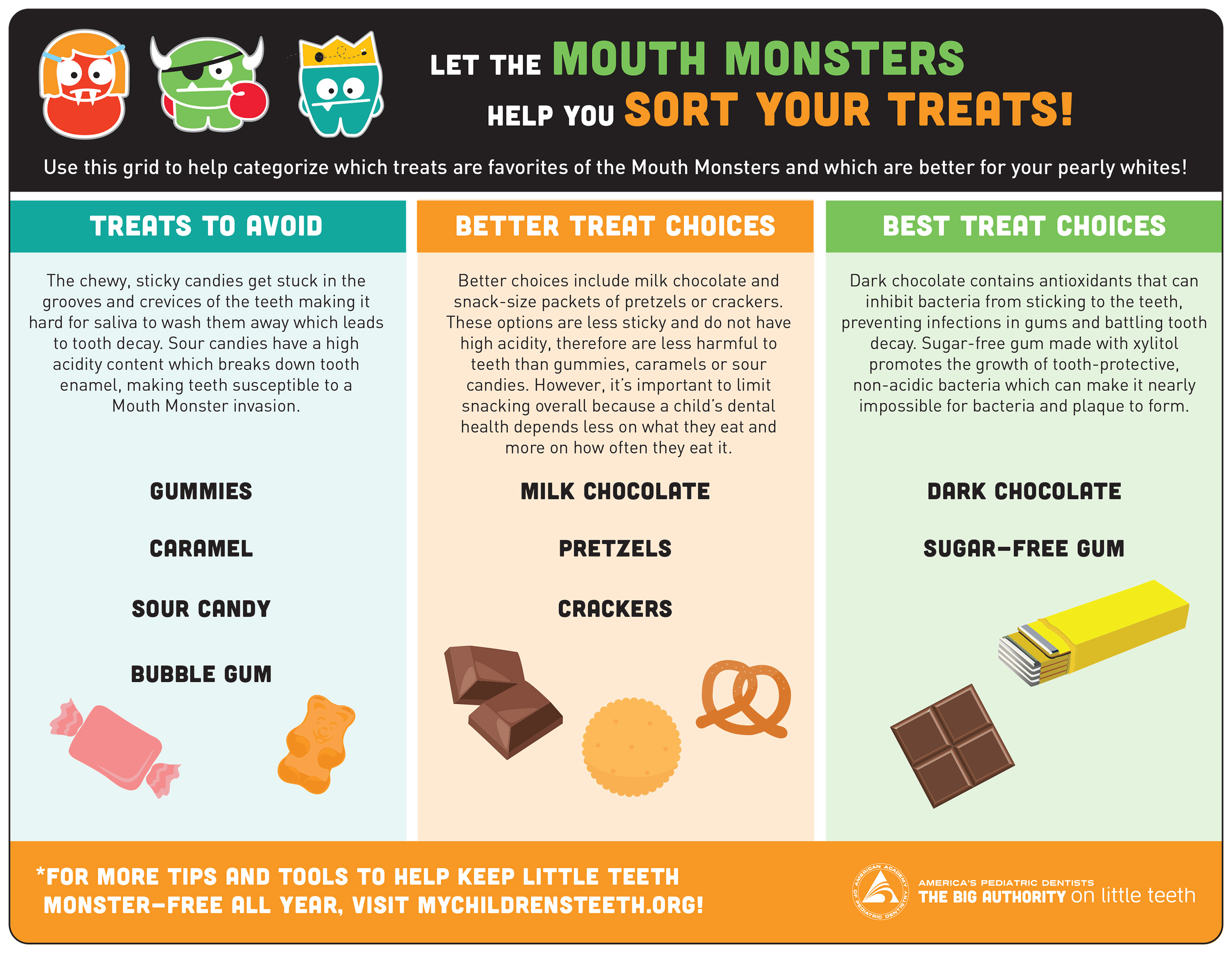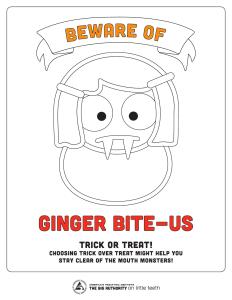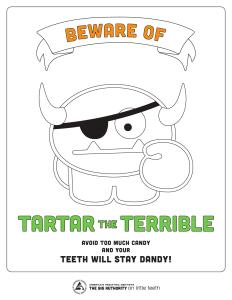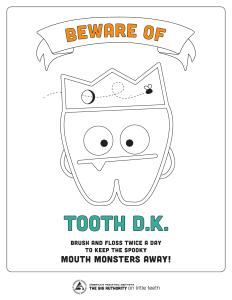THE AMERICAN ACADEMY OF PEDIATRIC DENTISTRY ENCOURAGES PARENTS TO BE AWARE OF MOUTH MONSTERS THIS HALLOWEEN
According to AAPD President Dr. Edward Moody, “Let children have fun and enjoy trick-or-treating or a Halloween party, but don’t let them choose the treats on their own. When they get home, go through the bags of candy together and let them pick a limited number of treats to keep. Remember, as a general rule, the stickier and gooey something is, the worse it is for teeth. Good oral health habits allow children to enjoy sweets as a treat and still keep a healthy smile.”
Below are some ideas parents and caregivers can incorporate into festivities to scare the Mouth Monsters away but still keep Halloween full of fun.
Beware of the Mouth Monsters’ Favorite Treats!
After a night of candy collecting, kids love to dive into their stash and begin sorting. Before they get started, remember that not all sweet treats impact teeth in the same way. A fun way to guide kids towards more tooth-friendly candy is by sorting goodies according to which are best and worst for your kids’ pearly whites, including:
- Candy to avoid includes gummies, caramels and sour candies. The chewy, sticky candies get stuck in the grooves and crevices of the teeth making it hard for saliva to wash them away which leads to tooth decay. Sour candies have a high acidity content which breaks down tooth enamel, making teeth susceptible to a Mouth Monster invasion.
- Better choices include milk chocolate and snack-size packets of pretzels or crackers. These options are less sticky and do not have high acidity, therefore are less harmful to teeth than gummies, caramels or sour candies. However, it’s important to limit snacking overall because a child’s dental health depends less on what they eat and more on how often they eat it.
- Best options for a sweet treat include sugar-free gum and dark chocolate. Dark chocolate contains antioxidants like tannins, polyphenols and flavonoids that can inhibit bacteria from sticking to the teeth, preventing infections in gums and battling tooth decay. Sugar-free gum made with xylitol promotes the growth of tooth-protective, non-acidic bacteria which can make it nearly impossible for bacteria and plaque to form.
Finally, for those who are passing out tricks and treats, remember non-food favorites like temporary tattoos, stickers and glow-sticks are great alternatives.
Swish and Brush!
Let’s face it - most kids don’t look forward to Halloween for the sugar-free gum and dark chocolate. And that’s ok. If kids are indulging in any kind of candy, ensure they drink plenty of water after eating the treat. Encourage them to swish the water around in the mouth to help dislodge particles that can get stuck and encourage the Mouth Monsters to latch onto tiny teeth.
And whatever you do, don’t let your young ones go to bed before brushing and flossing if all sides of a tooth cannot be cleaned by brushing alone. It’s a busy, exciting time, but as is the case with every other day of the year, kids should brush their teeth for at least 2 minutes, twice a day.
Set a Limit and Sell the Rest!
Set the number of treats that your child can keep – you may even want to select a number they can keep from each of the three categories of the sorting grid – and encourage them to sell the rest to a local dentist candy buy-back program. Most dentists participating in a Halloween buy-back program will pay $1 per pound of candy, which is then shipped out in care packages for U.S. soldiers serving overseas. Ask your pediatric dentist whether they are participating in a similar program during the first week of November.
For fun Halloween activities, more helpful tips and tools to help keep kids’ mouths healthy all year long, including a pediatric dentist finder, visit the Mouth Monster hub at http://www.mychildrensteeth.org.
About the American Academy of Pediatric Dentistry
The American Academy of Pediatric Dentistry is the recognized authority on children’s oral health. As advocates for children’s oral health, the AAPD promotes evidence-based policies and clinical guidelines; educates and informs policymakers, parents and guardians, and other health care professionals; fosters research; and provides continuing professional education for pediatric dentists and general dentists who treat children. Founded in 1947, the AAPD is a not-for-profit professional membership association representing the specialty of pediatric dentistry. Its 9,300 members provide primary care and comprehensive dental specialty treatments for infants, children, adolescents and individuals with special health care needs. For further information, visit the AAPD website at http://www.aapd.org or the AAPD’s consumer website at http://www.mychildrensteeth.org.
###













